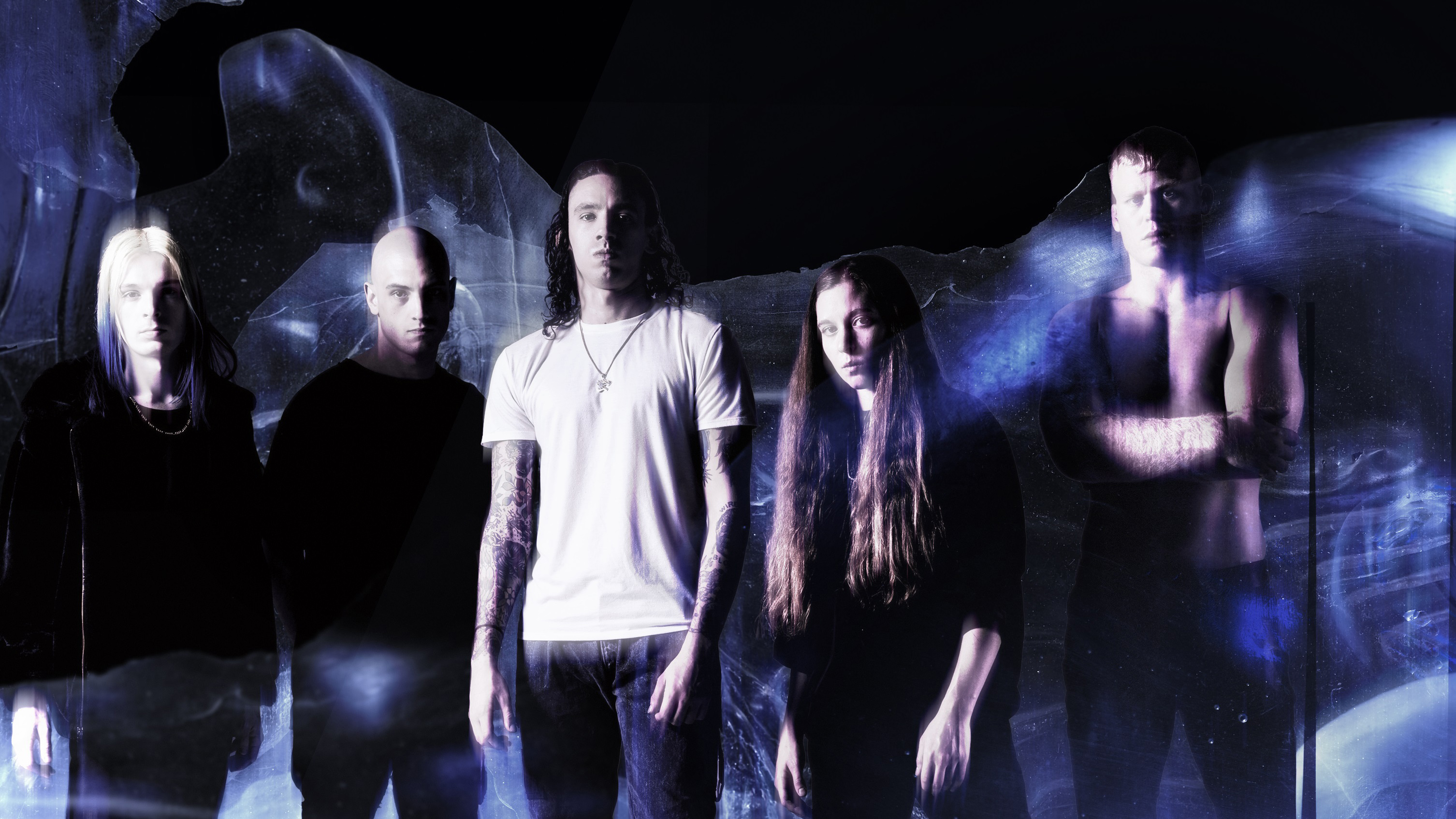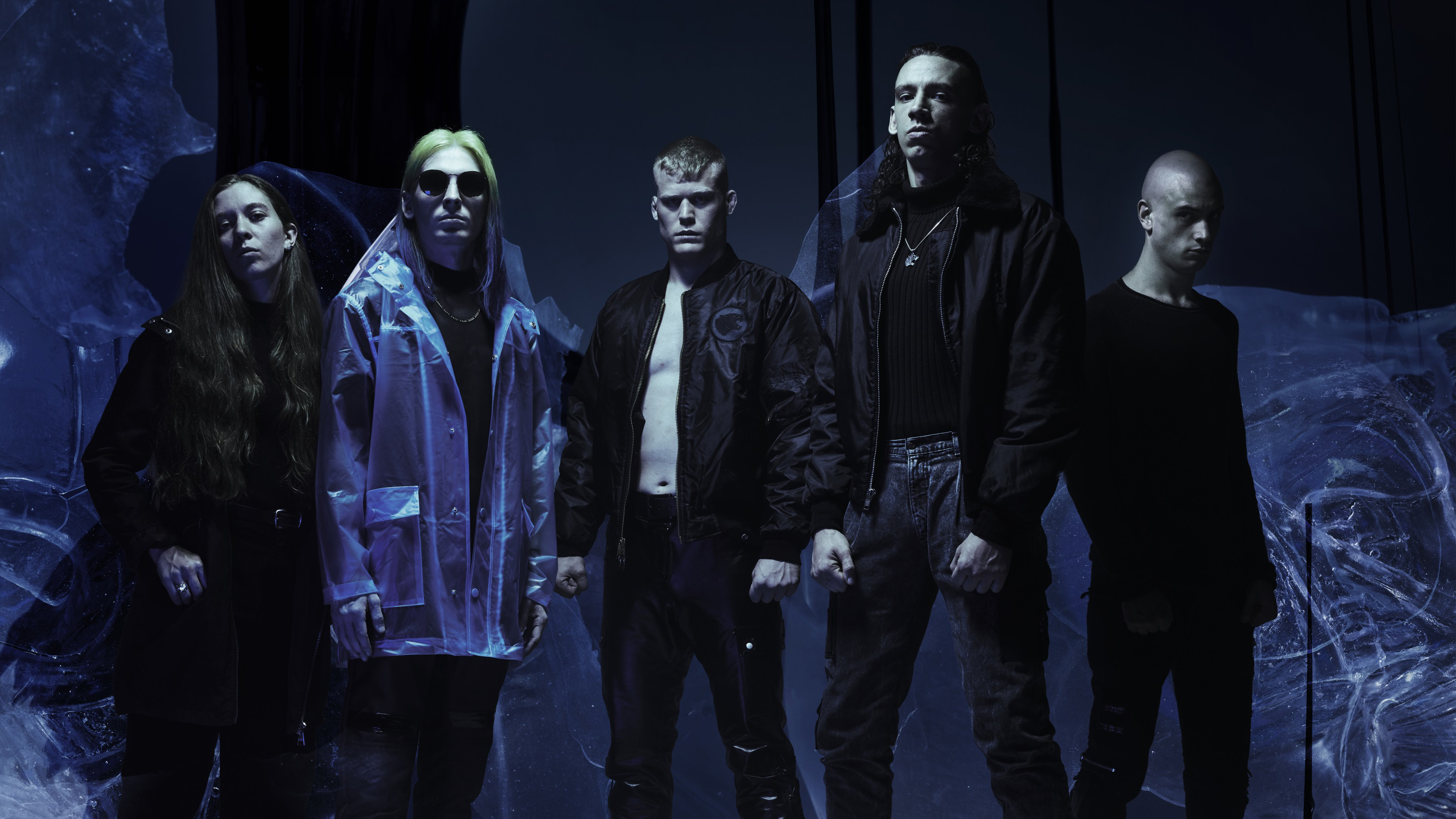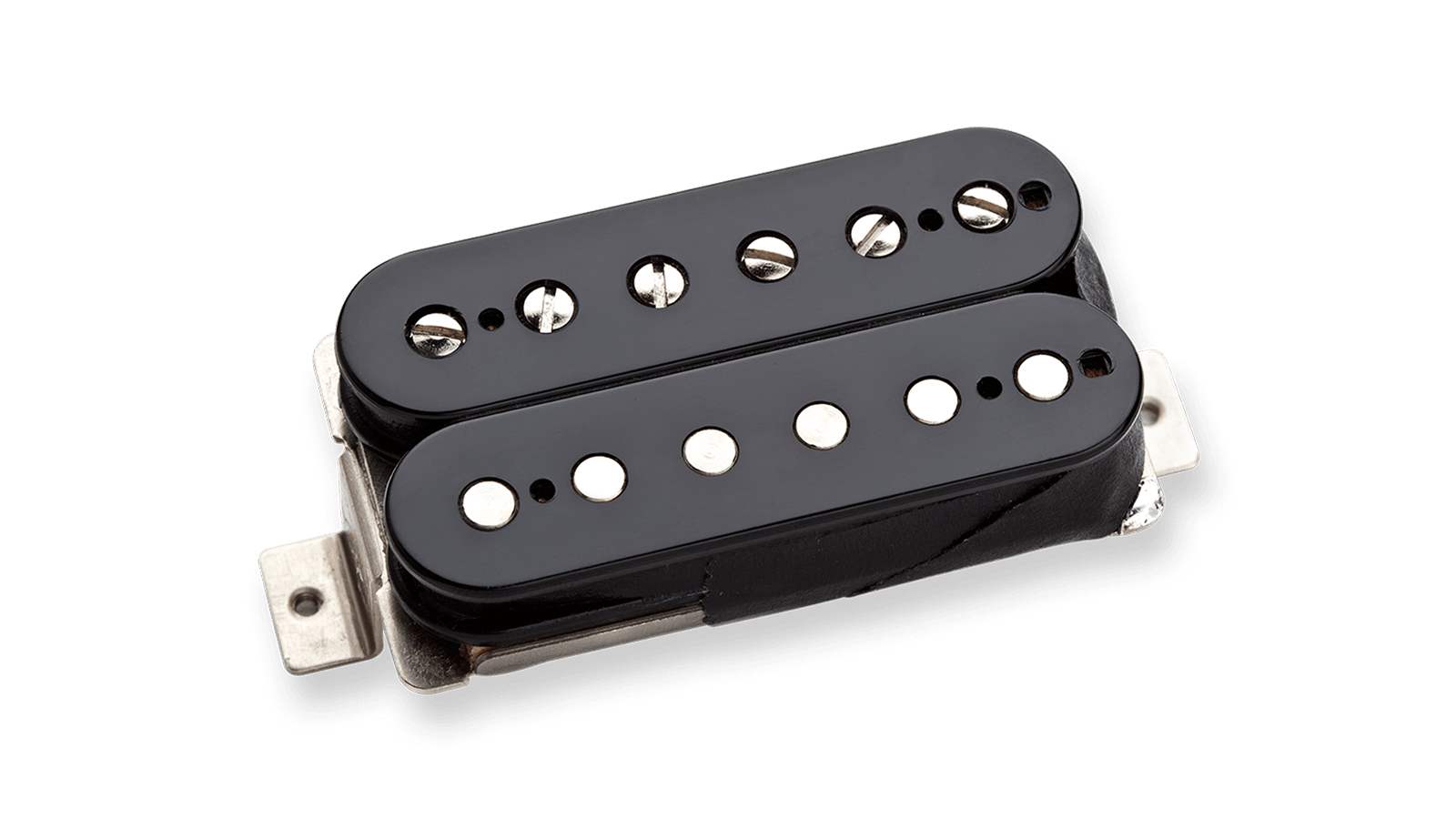"It’s the new style of heavy!" – Code Orange break down their landmark new album Underneath
Drummer / vocalist Jami Morgan and guitarist / vocalist Reba Meyers on how they've made their seminal statement in 2020

Code Orange are back and angrier than ever. But there's a lot more too. Over the last decade, the Pittsburgh metallers have become masters of heavy, channelling unholy aggression through a disorientating blur of noise – twisting hardcore and Bay Area brutality through a matrix of digital and industrial harshness. On new album Underneath, they’ve refined all of those elements into something even darker still...
“Going into this, we were definitely approaching it more like a movie,” says drummer/singer Jami Morgan, when told their latest recordings could easily have soundtracked a psychological thriller. He’s sat with guitarist Reba Meyers next to a fire in a London hotel, talking to MusicRadar about the new compositions which he produced with Nick Raskulinecz [Foo Fighters, Rush, Alice In Chains], with some help from co-producer Will Yip and early Nine Inch Nails member Chris Vrenna.
"This is 4D. I want you to be able to live inside."
Jami Morgan
“There was a big scope of an idea we were trying to fill,” continues Jami. “So we used samples and layers, doing surgery until it felt like it was popping off the page more than most metal which can be flat like a sheet of paper. It’s still art, but it’s more like a drawing. This is 4D. I want you to be able to live inside. I’d say the last one was more like a horror and this one’s the psychological sci-fi thriller. We’re trying to create a feeling you get from things that are visual and sensory, not just music. There’s a central idea that covers the whole record, grounding it all.”

“But it’s not like we just took samples from a movie or TV show,” adds Reba, after a sip of coffee. “There is some of that too, we mainly made our own noises. I’d hit record and really go for it with as many crazy sounds I could find and make a bank of it. That was a bit of a sampling technique, so I ended up with all these noises and used pieces of them in different songs…
“We might need a big swell, and then Shade [Eric Balderose guitars, vocals, keys] would have a different one that was really electronic but compliment the guitar swell, creating this accidental and unexpected element. There’s a lot of that throughout the album… little moments you hear a reverse something but you don’t know what it is and to be honest it’s probably a mixture of things.”
Swallowing The Rabbit Whole begins with a disjointed drumbeat and some pretty ominous piano octaves…
Reba: “That song probably had the most versions, probably around 20. I like the songs we mess about with the most, finding the perfect movie-style arc for it to flow. Because it wasn’t just a repeating verse and chorus thing, it’s a very cinematic song.
Get the MusicRadar Newsletter
Want all the hottest music and gear news, reviews, deals, features and more, direct to your inbox? Sign up here.
"It felt like a fully Code Orange song, with all of our tools being used. That’s why it felt like such a perfect starting point. It has the mood and represents Code Orange in an absolute way.”
Jami: “It’s the new style of heavy! I was actually watching a movie and then just walked into the bathroom and recorded a shitty little version of that on this little piano app on my phone. A lot of things I come up with are really simple but then the others take it in and expand on it. I had the beat in my head.
"When we finished that song, it was the first big moment where we realised where this album was heading. It was the moment we knew what needed to happen. And it has everyone’s work in it, which is cool. The first big riff is Dom’s riff, then Reba and Dom did the whole ending, Reba also coming up with a second verse melody that builds off the first… it was a cool combination of everyone getting something in on that one.”
"We had to redo loads of things just to work for Pro-Tools. But it made the songs better"
Reba Meyers
What kind of programs did you use this time round?
Jami: “We used and still use Ableton a lot. Nick wanted us to do Pro-Tools and at first we were really resistant but it ended up being good because we all know how to it properly now.”
Reba: “People sometimes associate computer programming with a certain style that’s kinda flat, but we used it to our advantage. We love tinkering with things and challenging each other with how weird we can get.
"We had to redo loads of things just to work for Pro-Tools. But it made the songs better, we had to reanalyse everything and figure out how to make it better. Ableton is amazing. The tricks you can do once you know where everything is. It just has so much to it. There are so many different ways to manipulate your sounds and do unexpected things that start simple and become huge. It’s an instrument in itself.”
Jami: “I don’t have to do that stuff. So I get to just make shit up and they actually figure out how to play it and turn it into music!”
Reba: “And that’s how you find things that have never been done, especially in this kind of music! Taking a chug up an octave with six plugins running and turning it into a completely different thing.”
"This record is very technical – there are hundreds and hundreds of layers."
Jami Morgan
How did you end up working with Chris Vrenna?
Jami: “It happened kinda randomly. We showed up to Nick’s and there were a few people I won’t name we’d reached out to about working in that position and it didn’t happen. So we got to Nick’s and he was like, ‘Chris Vrenna lives down here, let’s hit him up.’ And it was like, ‘Why didn’t we think of that?’ And he came down a day later after we sent him the demos.
"A bulk of this record was done before, and we’ll put those demos out at some point, so it was less creative, though Chris did add some awesome stuff. His role was more about helping Shade grow and become advanced in his technique and Pro-Tools.
"Chris is a professor of Pro-Tools and Ableton. He is very well versed and we needed somebody like that, because this record is very technical. There are hundreds and hundreds of layers. A lot of the time Reba was in her own room, just doing guitar leads direct to make them feel a bit more like hip-hop or electronic. It was like a factory… everyone working towards this goal.”
Nick Raskulinecz was definitely an interesting choice for producer, considering he’s more known for less extreme bands…
Jami: “Yeah, it was different for Nick because he’s more used to barebones style productions… so he probably got a bit stressed out (laughs)! Originally we recorded everything as a fully mixed, fully fleshed out album-level demos ourselves. Then we started working with Will Yip, who also worked with us on Forever, then brought the album to Nick and rerecorded it with him.
"So it was like doing a full album twice. We didn’t know how to verbally explain it to any producer, but Nick was really good at helping us facilitate and grow some of those ideas. He made us create a better version of the template we had made. We had to beat the demos… and we really loved those demos.”
There are lot of guitars on the album that don’t really sound like guitars…
Reba: “That’s why sampling techniques work really well for us. We might write something on guitar that gets turned into a synth thing or screamed vocals that have an insane effect that makes it sound more like a sample than a voice.
"We wanted to create a lot of it ourselves, it helped keep some of the realness of the album and add to the heaviness. It’s us, but using all these different approaches that we’ve been inspired by. It was more free this time. We didn’t really stick to pedalboards with x amount of pedals on them. It was more geared towards sounding the right mood for the song, whatever the fuck it might take – from some piece of shit to something expensive costing over $5000.”
"We approached it more like a hip-hop production in that sense, trying to add these sound effects into the story arc of the record"
Jami Morgan
Jami: “Plus, it’s hard to get stuff cleared, so it was just easier to make them ourselves. There were so many layers by the end. Shade’s got loads that he either made himself or got passed down from people or he’d just dug for.
"We approached it more like a hip-hop production in that sense, trying to add these sound effects into the story arc of the record. Last time we didn’t get onto that stuff until near the end. This time we’ve been looking at other kinds of music to see how they use electronics and sampling and soundscapes, and applying it to heaviness without taking the soul and hardness out of it. Because a lot of the times, when you try to combine them it makes the guitars and drums sound fake and flat, nowhere near hard enough. It’s all about balance.”
What kind of gear will you be using for this album cycle?
Reba: “I’m using the Axe-FX for effects but mainly the EVH which I really dug the sound of when we came to recording. I kinda refuse to fully give in to digital. I like a bit of everything! Dom [Landolina, guitars] is using an EVH live too, it’s helps cut through and link up with my sound. For the recordings, he used a physical Engl amp – not the plug-in like me – to create a deeper sound to compliment my higher end tones with more presence.
"During the demoes we were sat round a table at his house plugged into Ableton using Engl plug-ins, Guitar Rig, all sorts of stuff like that. What amp you are playing with can really affect how the riffs turn out. So if you have a digital kind of tone, it can inspire certain aspects to your playing. And then when we took it to the real amps, it would take another life of its own.

"He only rocks the bridge… both of us are like that. I’m not sure which EMG [pickup] he uses but it sounds awesome. He’s been running a Line 6 Helix, so does Joe [Goldman, bass], it’s a great unit. Dom has a certain way of playing that comes from a different side of metal to me – he’s great at tricks like using harmonics and really fast pinches, like on Erasure Scan and Swallowing The Rabbit Whole.”
Jami: “That’s why we stole him and put him in this band. We saw him in his own band and thought that was some cool shit. So we took him! The fact we used a real amp and the plug-in version shows just how much we’re mixing digital effects and live hard music. It makes all the sense in the world for us to use both.”
"It’s important to us for the full dynamics. It wakes you up and makes you listen harder”
Reba Meyers
You also use silence to emphasise the heaviness to come. Considering how much distortion is involved, what kind of gates do you run to pull this off live?
Reba: “We use gates dialled into the extreme. I use the ISP Decimator but I also have a lot of gates on my software, there’s a really good gate on the Engl plugin. It’s actually a huge annoyance, but it’s important to find a gate that doesn’t choke your tone and leave you spending too long trying to redial it in. When you factor in the other changes, what the room is like, how close you are to your amp… that’s all really tricky but it’s important to us for the full dynamics. It wakes you up and makes you listen harder.”
Jami: “Those silences could be my favourite trick! I’m always forcing those bits into our songs… it pisses everyone off and some of them get cut out. I think silence can be incredibly powerful when used effectively, really taking you out and bringing you back. Obviously other people do it, but not quite in the way we do it. Maybe it’s good we don’t do it as much as I want to do it (laughs). We’re kinda switching it up live… so we’re still figuring out our sounds. We had to practice those a lot, because it’s a lot harder doing it live.”
“I’m not drumming, I’m singing! That’s our big switch"
Jami Morgan
Switching it up live? Do spill the beans…
Jami: “I’m not drumming, I’m singing! That’s our big switch. We wanted to change it up a little and it sounded fun. Plus some of the drum shit on this album is impossible. So we decided that about a year ago and I still recorded all the drums on the record. We just wanted to take our live show to the next level. Everyone in the band felt the same way, like, ‘Dude, you just gotta sing!’ So we started trying it out… now we have a new drummer.”
The plot thickens…
Jami: “The economy might be shit but it’s not like we make any fuckin’ money anyway. We’re all splitting the crumb up anyway! The music might as well be good. That’s all we can hope for.
"Right now we’re working our new drummer to get ready for the first show, which will be in our hometown. It will be our first time doing it the new way. We like adding layers to our music. Like you said, the plot thickens. We want to keep it interesting and keep it fresh. It’s almost funny, we added someone last time round too but that’s just how it’s gonna be with this band.”
Underneath is out now on Roadrunner. For more info and tour dates visit codeorangetoth.com
Amit has been writing for titles like Total Guitar, MusicRadar and Guitar World for over a decade and counts Richie Kotzen, Guthrie Govan and Jeff Beck among his primary influences. He's interviewed everyone from Ozzy Osbourne and Lemmy to Slash and Jimmy Page, and once even traded solos with a member of Slayer on a track released internationally. As a session guitarist, he's played alongside members of Judas Priest and Uriah Heep in London ensemble Metalworks, as well as handling lead guitars for legends like Glen Matlock (Sex Pistols, The Faces) and Stu Hamm (Steve Vai, Joe Satriani, G3).
“Every note counts and fits perfectly”: Kirk Hammett names his best Metallica solo – and no, it’s not One or Master Of Puppets
“I can write anything... Just tell me what you want. You want death metal in C? Okay, here it is. A little country and western? Reggae, blues, whatever”: Yngwie Malmsteen on classical epiphanies, modern art and why he embraces the cliff edge










